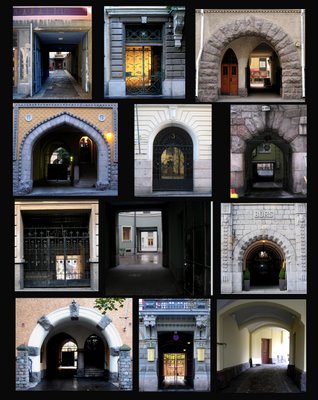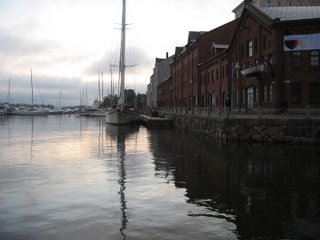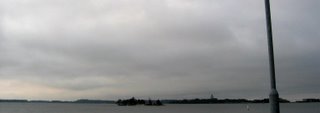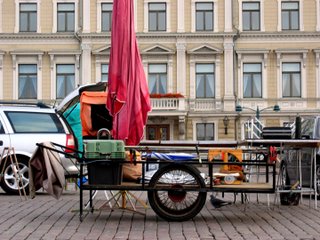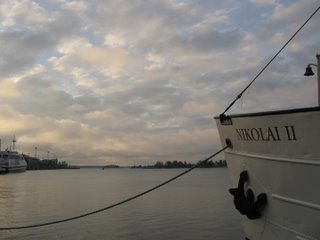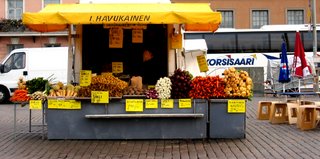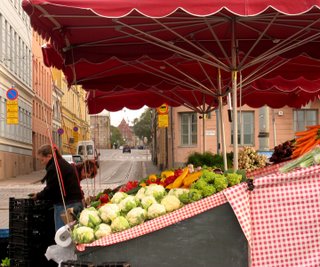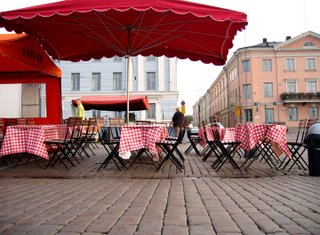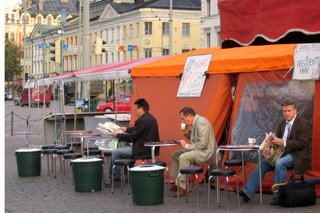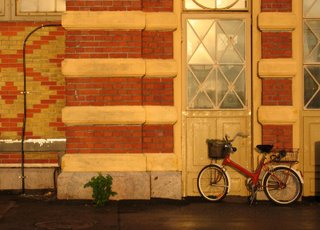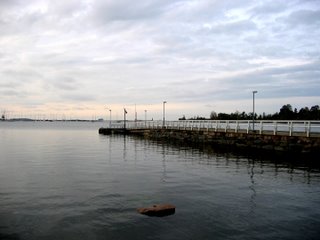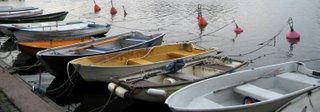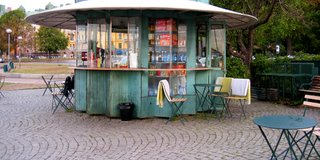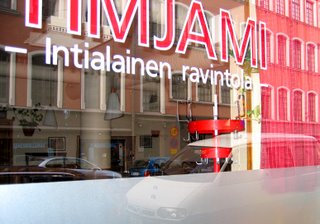A rather auspicious introduction to a young American man this morning led to the surprise opportunity to hear Peter Zumthor give a lecture this afternoon. The Finnish timber industry had chosen him for their annual ‘Spirit of Nature’ prize and he had come to
29 September 2006
Lupaava Esittely
28 September 2006
27 September 2006
Muminat
Thursday September 28, 2006
The sun has grown heavy with age and prefers most days now to travel across the sky instead of rising into it. More frequent are its failures to burn through the haze, which it has turned a melancholy shade of violet. In skies swollen with resignation it has become a daytime moon. The ghosts of sailboats hover in thick mists that linger on the sea. And once expectant gazes have hushed to sleepy reveries.
Monday September 25, 2006
What is the horizon? The furthest point visible at which the sky meets the earth or the sea. What is the furthest point when one is inside? What are the limits of the apprehendable from within a room, a house or a city?
That most fragmented space, in flight when one loses sight of the earth and the horizon consists of the sky upon itself, the nowhereness matched by the jerking of time moving forward and backward simultaneously. Yet somehow from this ambiguity one emerges somewhere that is fixed to the earth and to a constant clock. It’s like the non-space of the cinema where one goes to leave their bodies and its horizons behind for a few moments—so completely apart form this world for the sake of another.
I’ve always found the moments just after a film has ended to be some of the most excruciating. The transition is a shock and one is thrust out and back without the chance for a proper good-bye. And then left with the task of reconciling this reality to that one with out the least understanding of how to begin.
One can photograph Paris in black and white without sacrificing any of its substance and perhaps make an even truer representation of the city. Not so Helsinki. This city of pastel houses under crystal blue skies in the shimmering water begs to be captured in color. She wears grey with the steely solemnity of a diplomat; brooding and serious but always with a luminous horizon. Her sparkling blues and sunny yellows are always crisp and fresh. Her greens are of neither sea nor earth, but of legends read from painted books in wooden rooms by northern light. From the forests come her reds, where sanguine berries grow in brambles under huge and rusty trees. Her white is almost silver descending from the leaves and bark of birches that dance over fecund bogs of earthen black that seem to swallow up the light.
The sun has grown heavy with age and prefers most days now to travel across the sky instead of rising into it. More frequent are its failures to burn through the haze, which it has turned a melancholy shade of violet. In skies swollen with resignation it has become a daytime moon. The ghosts of sailboats hover in thick mists that linger on the sea. And once expectant gazes have hushed to sleepy reveries.
Monday September 25, 2006
What is the horizon? The furthest point visible at which the sky meets the earth or the sea. What is the furthest point when one is inside? What are the limits of the apprehendable from within a room, a house or a city?
That most fragmented space, in flight when one loses sight of the earth and the horizon consists of the sky upon itself, the nowhereness matched by the jerking of time moving forward and backward simultaneously. Yet somehow from this ambiguity one emerges somewhere that is fixed to the earth and to a constant clock. It’s like the non-space of the cinema where one goes to leave their bodies and its horizons behind for a few moments—so completely apart form this world for the sake of another.
I’ve always found the moments just after a film has ended to be some of the most excruciating. The transition is a shock and one is thrust out and back without the chance for a proper good-bye. And then left with the task of reconciling this reality to that one with out the least understanding of how to begin.
Monday September 18, 2006
In America we are collectively so self-conscious that the only acceptable attitude is apathy. Enthusiasm is too risky. It’s like being the only one dressed up on Halloween.
One can photograph Paris in black and white without sacrificing any of its substance and perhaps make an even truer representation of the city. Not so Helsinki. This city of pastel houses under crystal blue skies in the shimmering water begs to be captured in color. She wears grey with the steely solemnity of a diplomat; brooding and serious but always with a luminous horizon. Her sparkling blues and sunny yellows are always crisp and fresh. Her greens are of neither sea nor earth, but of legends read from painted books in wooden rooms by northern light. From the forests come her reds, where sanguine berries grow in brambles under huge and rusty trees. Her white is almost silver descending from the leaves and bark of birches that dance over fecund bogs of earthen black that seem to swallow up the light.
13 September 2006
Lämmin Sade
Saturday, September 9. 2006
I met Juhani Pallasmaa yesterday.
I was late—and wet, having gone the wrong direction on Tehtaankatu towards the sea in search of a small triangular park opposite which I was to find his office. As luck would have it there are three triangular parks on this street and the sea wraps from the west to the south. The rain had let up and the skies held until abut two minutes to five, the hour of our appointment, and in the ten minutes I required to reorient myself and walk back enough rain fell to render my umbrella superfluous as my coat sent sheets of water to my thirsty wool trousers. Marita, his office manager, met me at the door, welcomed me warmly and took my dripping coat. She led me to a long room made of books excepting the deep window at the furthest end. Several low lamps hung over a glass table set for two with wine, coffee and biscuits. She invited me to sit but before I could assess which chair I should take Juhani had made an enthusiastic entrance and was shaking my hand. Still damp and apologetic I tried feebly to tell him how pleased I was to meet him.
We talked for well over two hours, interrupted only once—his wife calling to say he should come home and make some food with her. Talking for ¾ of an hour beyond her request, the conversation punctuated by his sudden and frequent exits to fetch another book we’d been discussing from his office library of over seven thousand volumes. Of which one really only needs very few, he said, telling me he could survive with about six. He gave me the names of four. The pearls rolled off his tongue in rapid succession with an understated ease. We shared the same list of names, mine of admired authors, his of brothers and friends. He told me of the dinner shared by Groucho Marx and T. S. Eliot and their mutual respect. Brodsky, Pound, Borges, Pessoa, Husserl, Sartre, Perez-Gomez, Wilson, Tintoretto, Michelangelo, Lewerentz, Libeskind and Barragan and apes. Faithfully and without exception he reads what his friends recommend. He said one only learns from failures, success teaches nothing. And he told me that he was not a believer in theoretical starting points, that architecture requires a certain attitude and a sharpness of perception. He told me there was no meaning without touching some existential core, but that once you’d done that… He said “Architectural meaning comes before language, language is not the primary condition.” leading us into a discussion of Levi-Strauss, Chomsky, Husserl, Wittgenstein and pre-reflective meaning.
He sent me away with two books, one mine to keep and another to borrow. He offered his library and space to work and told me my time in Finland would be very important for me. I wished him bon voyage for his trip to the south of France, an escape with his family from the 70th birthday next week brings and he kissed me once on each cheek and walked me into the hallway, now chatting again telling me of the two flats he’s designing in the extra office space he no longer requires.
The rain had stopped. Early Friday evening in Helsinki is quiet.
And so very beautiful.
Subscribe to:
Comments (Atom)
